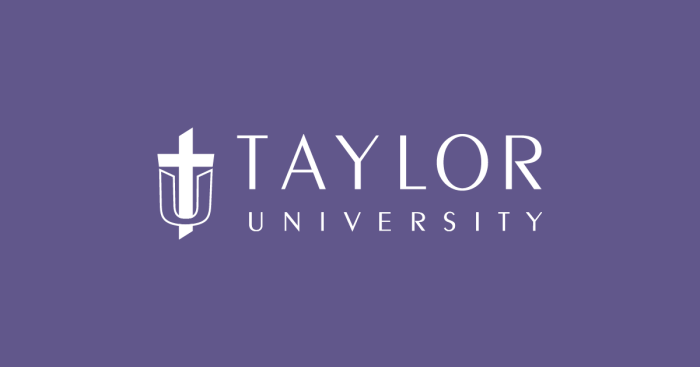Embark on an educational journey where affordability meets excellence. Taylor University, renowned for its academic prowess and vibrant campus life, invites you to explore the intricacies of its pricing structure and the financial assistance available to empower your academic aspirations. Join us as we navigate the complexities of tuition, fees, housing, meal plans, and more, equipping you with the knowledge to make informed decisions about your future at Taylor University.
Tuition and Fees
Taylor University offers various undergraduate and graduate programs, each with its own tuition structure. Understanding the costs associated with your desired program is crucial for planning your education.
Undergraduate Tuition
Undergraduate tuition rates at Taylor University vary depending on the student’s residency status. Here’s an overview of the current tuition rates:
| Residency Status | Tuition Rate |
|---|---|
| In-State | $35,280 |
| Out-of-State | $41,400 |
Graduate Tuition
Graduate tuition rates also vary based on the specific program and course load. Here’s a general range of tuition rates for graduate programs:
- Master’s Programs: $12,000 – $18,000 per semester
- Doctoral Programs: $15,000 – $20,000 per semester
Additional Costs
In addition to tuition, students may incur additional costs during their time at Taylor University, including:
- Housing: On-campus housing options range from $3,000 to $7,000 per semester.
- Meal Plans: Meal plans start at $2,000 per semester.
- Course Materials: The cost of textbooks and other course materials varies depending on the program and courses taken.
- Technology Fee: A technology fee of $500 per semester covers access to campus technology resources.
- Health Insurance: Students who do not have their own health insurance must purchase the university’s health insurance plan, which costs approximately $2,000 per year.
Financial Aid

Taylor University offers a comprehensive financial aid program to assist students in meeting the costs of higher education. Various types of financial aid are available, including scholarships, grants, loans, and work-study programs.
To apply for financial aid, students must complete the Free Application for Federal Student Aid (FAFSA) and submit it to the U.S. Department of Education. The FAFSA collects information about the student’s family income, assets, and expenses, and determines the student’s eligibility for various types of financial aid.
Scholarships
Scholarships are awarded to students based on academic merit, athletic ability, leadership, or other criteria. Scholarships do not have to be repaid.
- Presidential Scholarship: Awarded to students with a high school GPA of 3.8 or higher and an ACT score of 28 or higher.
- Dean’s Scholarship: Awarded to students with a high school GPA of 3.5 or higher and an ACT score of 25 or higher.
- Athletic Scholarships: Awarded to students who demonstrate exceptional athletic ability and meet NCAA eligibility requirements.
Grants
Grants are awarded to students based on financial need. Grants do not have to be repaid.
- Federal Pell Grant: Awarded to undergraduate students with an Expected Family Contribution (EFC) of $0.
- Federal Supplemental Educational Opportunity Grant (SEOG): Awarded to undergraduate students with an EFC of $0 and who demonstrate exceptional financial need.
- Indiana State Grant: Awarded to undergraduate students who are Indiana residents and have an EFC of $10,000 or less.
Loans
Loans are borrowed money that must be repaid with interest. Loans are available to both undergraduate and graduate students.
- Federal Direct Subsidized Loan: Awarded to undergraduate students with an EFC of $0 and who demonstrate financial need.
- Federal Direct Unsubsidized Loan: Awarded to undergraduate and graduate students regardless of financial need.
- Federal Direct PLUS Loan: Awarded to parents of undergraduate students and to graduate students.
Room and Board

Taylor University provides various housing options for students, ranging from traditional residence halls to cozy apartments. Each option offers unique amenities and costs to cater to different preferences and budgets.
The University highly encourages freshmen and sophomores to reside on campus to foster a sense of community and provide convenient access to academic resources and campus activities.
Housing Options
| Housing Type | Room Type | Cost (per semester) | Amenities |
|---|---|---|---|
| Residence Halls | Double or triple occupancy | $2,500 – $3,000 | Shared bathrooms, common areas, and laundry facilities |
| Apartments | One or two bedrooms | $3,500 – $4,500 | Private bathrooms, kitchens, and living spaces |
| Townhouses | Two or three bedrooms | $4,000 – $5,000 | Private bedrooms, bathrooms, kitchens, and living spaces |
Meal Plans
Taylor University offers flexible meal plans to accommodate various dining preferences and schedules. Students can choose from a range of plans that provide meals at the campus dining hall, The Commons.
- Unlimited Plan: Provides unlimited meals at The Commons for $1,800 per semester.
- Block Plan: Offers a set number of meals per week, ranging from 10 to 21 meals. Prices vary based on the number of meals selected.
- Flex Plan: Provides a combination of meals and declining balance, allowing students to use their balance at The Commons or other campus dining locations. Prices vary based on the amount of declining balance purchased.
Estimated Total Cost of Attendance

The estimated total cost of attendance at Taylor University varies depending on several factors, including residency status, housing choices, and financial aid awards. The table below Artikels the estimated costs for different types of students:
| Category | Tuition and Fees | Room and Board | Other Expenses | Total Cost |
|---|---|---|---|---|
| In-State | $36,000 | $12,000 | $4,000 | $52,000 |
| Out-of-State | $42,000 | $14,000 | $4,000 | $60,000 |
| International | $48,000 | $16,000 | $4,000 | $68,000 |
In addition to the costs listed above, students may also need to budget for expenses such as transportation, books, and personal expenses. The actual cost of attendance may vary depending on individual spending habits and lifestyle choices.
Tips for Budgeting and Managing Expenses
- Create a budget and track your expenses.
- Consider living in a dorm or off-campus housing with roommates to save on rent.
- Choose a meal plan that fits your eating habits and budget.
- Take advantage of student discounts on transportation, entertainment, and other expenses.
- Apply for financial aid and scholarships to reduce the cost of attendance.
Comparison to Other Universities
When comparing the cost of attendance at Taylor University to similar universities, it’s important to consider factors such as tuition, fees, room and board, and other expenses. Taylor University’s tuition and fees are comparable to other private universities in the region, but may be higher than public universities.
Room and board costs at Taylor University are also comparable to other private universities, but may be higher than public universities. However, Taylor University offers a variety of financial aid options to help students manage the cost of attendance.
Factors to Consider
When comparing the cost of attendance at different universities, students should consider the following factors:
- Tuition and fees
- Room and board
- Other expenses (e.g., books, supplies, transportation)
- Financial aid options
- Location
- Academic programs
General Inquiries
What factors influence the total cost of attendance at Taylor University?
The total cost of attendance can vary depending on factors such as your residency status (in-state or out-of-state), housing choices, meal plan selection, and financial aid awards.
How can I maximize my financial aid eligibility?
To maximize your financial aid eligibility, it is crucial to complete the Free Application for Federal Student Aid (FAFSA) promptly and thoroughly. Additionally, explore scholarship opportunities offered by Taylor University and external organizations.
What types of housing options are available on campus?
Taylor University provides a range of on-campus housing options, including traditional residence halls, apartments, and townhouses. Each option offers unique amenities and costs, allowing you to choose the living space that best suits your needs and preferences.
Can I customize my meal plan to fit my dietary needs and preferences?
Yes, Taylor University offers flexible meal plans that can be tailored to meet your dietary needs and preferences. You can choose from various options, including unlimited meal plans, declining balance plans, and flex plans that allow you to purchase meals as needed.
How does Taylor University compare to other universities in terms of cost?
Taylor University’s cost of attendance is comparable to similar universities in the region and with similar academic programs. However, the university’s commitment to financial aid and scholarships makes it accessible to students from diverse socioeconomic backgrounds.




